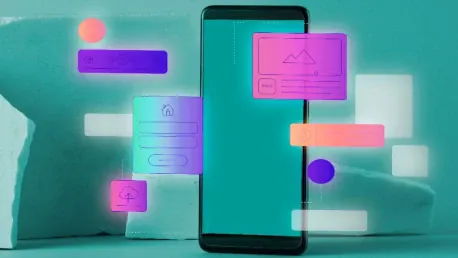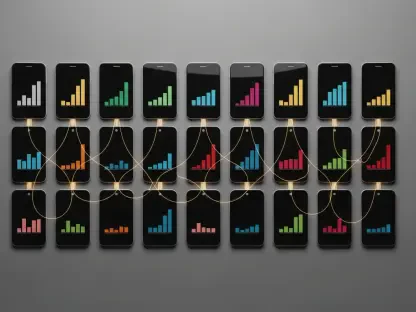The rapid strides in Artificial Intelligence (AI) technology are expected to significantly transform the mobile app development landscape by 2025. As AI integrates more deeply into mobile applications, it will revolutionize the entire development lifecycle, enhance user experiences, and push technological innovation to new heights. The predictions and insights from Octal IT Solutions shine a light on the impending advancements driven by AI in this field, laying out a future where mobile apps will be smarter, more efficient, and incredibly user-centric.
AI Integration in Mobile Apps by 2025
Artificial Intelligence is anticipated to become a keystone technology in mobile app development by 2025. According to research conducted by Octal IT Solutions, a striking 78% of developers believe AI will be a fundamental component of all mobile applications within the next few years, reshaping the ways these apps are developed and utilized. This integration is predicted to not only streamline the development process but also facilitate the creation of more sophisticated and highly personalized user experiences.
Developers have already begun exploring AI tools, with 67% focusing their efforts on machine learning (ML) and predictive analytics to enhance apps. These tools allow for the personalization of user experiences and the automation of various tasks, making applications more intuitive and efficient. As AI continues to evolve, its role in mobile app development will undoubtedly expand, giving rise to increasingly innovative and user-centric applications. The impending wave of AI-driven mobile apps promises to set a new standard in mobile technology.
AI’s transformative power in mobile apps isn’t just limited to enhancing individual features or functionalities; it promises to overhaul the entire app ecosystem. This transition involves a comprehensive shift in how apps are conceived, designed, developed, and deployed. As AI capabilities broaden and become more sophisticated, the development process is expected to become more agile, paving the way for rapid innovation and more groundbreaking applications. Users, in turn, will benefit from highly personalized interactions, intelligent content recommendations, and seamless app experiences that AI is poised to deliver.
Streamlining the Development Process
The advent of AI is set to significantly streamline the mobile app development process, making it faster and more cost-effective. Industry experts predict that AI will drastically reduce development time and costs by automating routine tasks such as code generation, testing, and bug fixing. This level of automation will empower developers to focus on more complex and creative aspects of app development, enhancing the quality and functionality of the final product.
By 2025, it is expected that AI-driven tools will manage a large portion of the development process, from initial coding to final testing stages. These tools will not only expedite the development timeline but also improve the overall quality of mobile applications. The impact of such automation extends beyond mere efficiency—it also allows businesses to bring their applications to market at a faster pace and with greater agility. As a result, companies can maintain a competitive edge in an ever-evolving technological landscape while meeting user expectations for high-quality, fast-to-market products.
The streamlining of the development process through AI also promises to eliminate many of the traditional bottlenecks and challenges associated with mobile app creation. Enhanced bug detection, smart code suggestions, and automated testing will ensure that developers can deliver robust and reliable applications with fewer errors and less manual intervention. The fusion of AI in the development process highlights a future where mobile app creation is not only more efficient but also more innovative, paving the way for the next generation of intelligent and responsive applications.
Hyper-Personalization
One of the most exhilarating prospects of AI in mobile app development is the concept of hyper-personalization. According to Octal IT Solutions’ research, 83% of respondents believe that AI will be the driving force behind hyper-personalization in mobile applications by 2025. This evolution means that applications will be capable of tailoring content recommendations, user interfaces, and predictive features to suit the unique behaviors and preferences of individual users.
Hyper-personalization is set to enhance user engagement and satisfaction by delivering a highly customized and relevant experience. AI algorithms will analyze vast amounts of user data to discern patterns and preferences, enabling apps to offer content and features that are specifically tailored to each user. This level of personalization will redefine user experience standards in mobile applications, ensuring that interactions are not only more efficient but also more meaningful and enjoyable.
As AI continues to innovate, the potential for hyper-personalization becomes even more promising. Future mobile applications could dynamically adjust to the evolving needs and habits of users, providing real-time, context-aware suggestions and enhancements. This shift would mark a significant departure from one-size-fits-all applications, ushering in an era of truly personalized digital experiences. The power of AI to transform user interaction through hyper-personalization underscores its pivotal role in the future of mobile app development.
Security Enhancements
In the realm of mobile app development, security remains a paramount concern, and AI is poised to revolutionize this aspect as well. With 64% of developers underscoring its significance, AI is expected to enhance app security through real-time vulnerability detection, fraud prevention, and advanced user authentication methods such as biometrics. These AI-driven security features will play a crucial role in protecting user data and app infrastructure from unauthorized access and data breaches.
As the landscape of cyber threats continues to evolve, AI offers a robust defense mechanism for mobile apps. By continuously monitoring for vulnerabilities and anomalous activities, AI can swiftly identify and mitigate potential security risks, ensuring that applications remain secure and reliable. The proactive approach facilitated by AI in security measures promises to safeguard sensitive user information and maintain the integrity of mobile applications.
The integration of AI in mobile app security will extend beyond traditional authentication methods, incorporating more sophisticated techniques such as behavioral biometrics and anomaly detection. These advanced security measures will not only enhance user trust but also set a new benchmark for security standards in mobile applications. As mobile apps become increasingly integral to everyday life, the role of AI in ensuring their security will be indispensable, providing users with peace of mind in their digital interactions.
Voice and Gesture Recognition
The incorporation of AI-powered voice and gesture recognition technologies is set to become a defining feature of mobile applications, particularly in sectors such as smart home, automotive, and healthcare. These technologies will render apps more intuitive and interactive, allowing users to control and engage with their devices in a more natural and seamless manner.
Voice and gesture recognition will significantly enhance user experiences by providing hands-free and smooth interactions. For instance, in healthcare settings, voice recognition could enable doctors to access patient records and input data without the need for manual entry. Similarly, in smart home applications, gesture recognition could allow users to control their devices with simple hand movements, making everyday tasks more convenient and enjoyable.
The potential applications of voice and gesture recognition technologies are vast, promising to revolutionize how users interact with mobile applications. By enabling more natural and context-aware interactions, these AI-driven technologies will enhance accessibility and usability, making mobile apps more accommodating to a broader range of users. As AI continues to advance, the integration of voice and gesture recognition capabilities will further elevate the user experience, setting new standards for interactivity and engagement in mobile applications.
AI and Augmented Reality (AR)
The synergy between Artificial Intelligence and Augmented Reality (AR) is anticipated to bring transformative changes to various industries, particularly retail and entertainment. According to Octal IT Solutions, 72% of respondents foresee substantial advancements in these sectors through the integration of AI with AR, resulting in immersive and interactive app features.
AI-driven AR applications promise to provide users with enriched experiences, such as virtual try-ons in retail or interactive gaming environments. By leveraging AI, these applications can offer more realistic and engaging AR experiences, blurring the boundaries between the digital and physical worlds. The integration of AI and AR is poised to unlock new possibilities for innovation and user engagement, creating more captivating and interactive mobile applications.
The combination of AI and AR will also drive the development of more intelligent and responsive applications. For example, in the retail sector, AI-powered AR apps could analyze user preferences and behaviors to offer personalized product recommendations and virtual try-ons, enhancing the shopping experience. In entertainment, AI-driven AR applications could provide more immersive and interactive gaming environments, elevating user engagement and satisfaction. As AI continues to evolve, the integration with AR will pave the way for a new era of mobile applications that are not only more engaging but also more innovative.
AI-Driven Mobile App Development Services by Octal IT Solutions
Octal IT Solutions stands at the forefront of integrating AI into mobile app development, offering a range of services designed to enhance user experiences, automate processes, and enable data-driven decision-making. Their AI-driven services encompass various aspects, including personalized user experiences, predictive analytics, automation and process optimization, and advanced security features.
Through the utilization of AI, Octal IT Solutions helps businesses create more intelligent and efficient mobile applications. Their services also extend to voice and gesture recognition, AI-powered AR/VR experiences, business intelligence, chatbots, and content recommendations. These AI-driven solutions allow businesses to stay competitive in an ever-evolving technological landscape, delivering mobile apps that are more engaging, secure, and user-centric.
The comprehensive AI-driven mobile app development services offered by Octal IT Solutions underscore their commitment to innovation and excellence. By leveraging AI technology, they enable businesses to optimize their operations, improve user satisfaction, and make informed decisions based on real-time data and insights. As the mobile app development industry continues to evolve, Octal IT Solutions remains at the cutting edge, providing the tools and expertise necessary to navigate the future of mobile technology.
Impact on Various Industries
The advancements driven by AI in mobile app development are expected to have profound impacts across various industries. In the healthcare sector, AI-powered features such as virtual consultations, medical image analysis, and real-time health monitoring will significantly enhance telemedicine apps. Health data analysis from wearables will empower patients and assist doctors in making accurate diagnoses.
The finance sector will also benefit from AI-driven mobile applications, with features like personalized financial advice, predictive analytics, and smarter investment strategies. Real-time fraud detection, financial planning automation, and personalized recommendations will enhance user engagement and risk management, revolutionizing the way financial services are delivered.
In retail, AI will transform shopping experiences both online and in-store. Personalized shopping recommendations, immersive AR experiences, and optimized inventory management backed by predictive demand analytics will redefine the retail landscape. Similarly, the education sector will see significant advancements through AI-driven mobile applications, offering personalized learning experiences, virtual tutoring, and real-time feedback.
AI-driven advancements will also impact on-demand services, such as taxi booking and educational tutor apps. Enhanced user interactions and data-driven insights will allow businesses to remain competitive in a crowded market, delivering services that are more efficient and user-friendly. The widespread adoption of AI in mobile app development promises to bring about a new era of innovation and excellence across various industries, transforming the way we interact with technology and improving our daily lives.
Conclusion
The rapid advancements in Artificial Intelligence (AI) technology are poised to drastically reshape the mobile app development landscape by 2025. As AI continues to weave itself more intricately into mobile applications, it will bring about a revolution in the entire development lifecycle. This transformation will not only enhance the development process but will also significantly improve user experiences, making apps more intelligent and efficient.
AI’s deep integration will allow developers to craft more personalized and user-centric applications. Features such as intelligent customer support, predictive analytics, and advanced security measures will become standard in mobile apps. For instance, chatbots powered by AI will provide instant customer service, while machine learning algorithms will predict user preferences, offering tailored content that elevates the user’s interaction with the app.
Furthermore, AI will enable more sophisticated data analysis, helping developers understand user behavior and preferences with greater accuracy. This will lead to more intuitive user interfaces and seamless app functionalities. Enhanced security protocols driven by AI will also bolster privacy protections, ensuring user data remains secure.
In summary, the insights from Octal IT Solutions highlight a future where AI-driven advancements will lead to smarter, more efficient, and user-focused mobile applications. The landscape of mobile app development is on the cusp of a significant transformation, promising a new era of innovation and enhanced user experiences by 2025.









